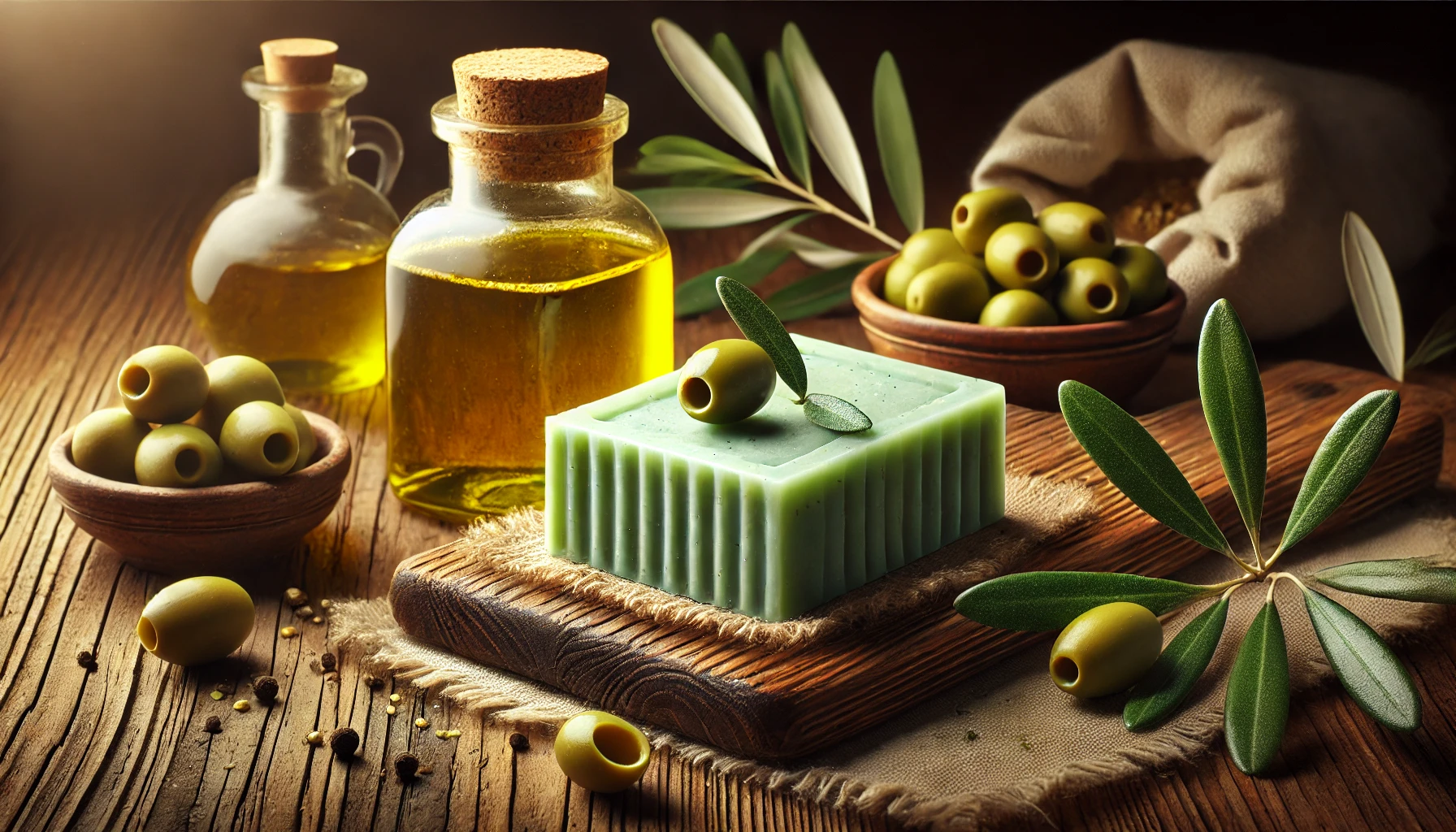The Importance and Benefits of Olive Oil in Soap Making

Soap is an essential part of daily hygiene, but not all soaps are created equal. Many commercial soaps contain harsh chemicals that strip the skin of its natural moisture. This is where olive oil soap comes in as a game-changer! Olive oil has been used for centuries in soap making due to its nourishing, moisturizing, and skin-friendly properties.
If you are interested in natural, chemical-free soap, then olive oil should be your go-to ingredient. In this blog, we will explore why olive oil is essential in soap making, its amazing benefits, and how you can make your own olive oil soap at home.
বাংলা পোস্ট
Why Use Olive Oil in Soap Making?
Olive oil is a natural emollient that helps retain the skin’s moisture while cleansing it gently. Here’s why it is a must-have ingredient in handmade and organic soaps:
✅ Mild and Gentle on Skin – Perfect for sensitive skin, including babies.
✅ Deep Moisturizing – Prevents dryness and keeps skin soft.
✅ Rich in Antioxidants – Protects against environmental damage.
✅ Creates a Long-Lasting Soap Bar – Does not melt away quickly like commercial soaps.
✅ Naturally Hypoallergenic – Less likely to cause irritation or allergies.
Unlike other oils, olive oil does not clog pores, making it suitable for all skin types, including acne-prone and sensitive skin.
Health and Skin Benefits of Olive Oil Soap
1. Deeply Moisturizes the Skin 💧
Olive oil contains natural glycerin, which helps lock in moisture, keeping the skin hydrated, soft, and smooth. Unlike synthetic soaps that strip away natural oils, olive oil soap nourishes the skin.
👉 Best for: People with dry, flaky, or sensitive skin.
2. Anti-Aging Properties 🌿
Rich in antioxidants like Vitamin E and polyphenols, olive oil soap helps reduce wrinkles, fine lines, and premature aging by fighting free radicals.
👉 Best for: Those looking to maintain youthful, glowing skin.
3. Gentle and Safe for All Skin Types 👶
Olive oil soap is hypoallergenic, meaning it is safe for people with eczema, psoriasis, and baby skin. It cleanses without causing irritation.
👉 Best for: Babies, sensitive skin, and people with skin conditions.
4. Naturally Antibacterial & Anti-Inflammatory 🦠
The antibacterial and anti-inflammatory properties of olive oil help prevent acne, reduce redness, and heal minor skin infections.
👉 Best for: Acne-prone and irritated skin.
5. Environmentally Friendly & Chemical-Free 🌍
Unlike commercial soaps that contain parabens, sulfates, and artificial fragrances, handmade olive oil soap is biodegradable and free from harmful chemicals.
👉 Best for: Those who want eco-friendly skincare solutions.
How to Make Homemade Olive Oil Soap (Easy Recipe!)
Want to make your own natural olive oil soap? Here’s a simple cold-process recipe to try at home!
Ingredients:
✔ 500 ml Extra Virgin Olive Oil
✔ 60 grams Lye (Sodium Hydroxide – NaOH)
✔ 200 ml Distilled Water
✔ 10 drops Essential Oil (Lavender, Tea Tree, or Rose – optional)
✔ 1 tbsp Coconut Oil (for extra lather – optional)
Step-by-Step Instructions:
🔹 Step 1: Prepare the Lye Solution
- Wear gloves and safety goggles.
- In a heat-resistant glass or stainless steel bowl, slowly add lye to water (NEVER water to lye, as it can cause a reaction).
- Stir carefully and let it cool.
🔹 Step 2: Warm the Olive Oil
- In a separate container, warm the olive oil slightly.
- If using coconut oil, mix it in for extra lather.
🔹 Step 3: Combine the Mixtures
- Once the lye solution and olive oil are at the same temperature (~110°F / 43°C), slowly pour the lye mixture into the olive oil while stirring.
- Blend using a stick blender until the mixture thickens (this is called “trace”).
🔹 Step 4: Add Essential Oils
- Mix in essential oils of your choice for fragrance and extra skin benefits.
🔹 Step 5: Pour into Molds
- Pour the mixture into soap molds and smooth the top.
- Cover with a towel and let it sit for 24-48 hours.
🔹 Step 6: Curing the Soap
- Once hardened, remove from molds and cut into bars.
- Allow the soap to cure for 4-6 weeks before using.
✨ Congratulations! You have made your own natural olive oil soap!
Olive Oil vs. Other Oils in Soap Making
How does olive oil compare to other popular oils used in soap making?
| Oil Type | Moisturizing | Foaming | Hardness | Best For |
|---|---|---|---|---|
| Olive Oil | ⭐⭐⭐⭐⭐ | ⭐⭐ | ⭐⭐⭐ | Sensitive & Dry Skin |
| Coconut Oil | ⭐⭐⭐ | ⭐⭐⭐⭐⭐ | ⭐⭐⭐⭐ | Extra Lather & Hardness |
| Palm Oil | ⭐⭐⭐ | ⭐⭐⭐ | ⭐⭐⭐⭐⭐ | Long-Lasting Bar |
| Castor Oil | ⭐⭐⭐⭐ | ⭐⭐⭐⭐⭐ | ⭐⭐ | Extra Creamy Lather |
💡 Best combination: Use 80% olive oil + 10% coconut oil + 10% castor oil for the perfect balance of moisture and lather!
Why Choose Olive Oil Soap Over Commercial Soaps?
❌ Commercial Soaps Contain:
- Harsh Chemicals that irritate the skin.
- Synthetic Fragrances that cause allergies.
- Artificial Preservatives that strip natural oils.
✅ Olive Oil Soap Offers:
- 100% Natural Ingredients for healthy skin.
- Deep Hydration & Moisture Retention.
- Safe for Babies & Sensitive Skin.
✨ Switching to olive oil soap can transform your skincare routine!
Final Thoughts
Olive oil is an essential ingredient in soap making, offering unmatched skincare benefits. From deep hydration and anti-aging properties to gentle cleansing and eco-friendliness, olive oil soap is the perfect natural alternative to commercial soaps.
🌿 So why wait? Try olive oil soap today and experience the difference! 🌿
👉 Have you ever used olive oil soap? Share your experience in the comments below! 😊

One thought on “The Importance and Benefits of Olive Oil in Soap Making”